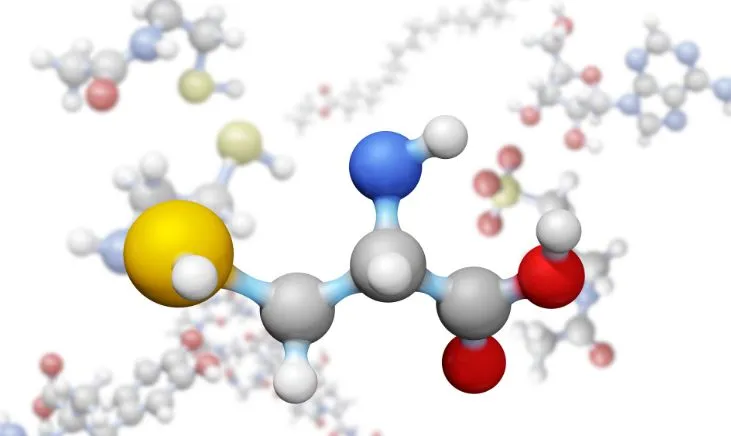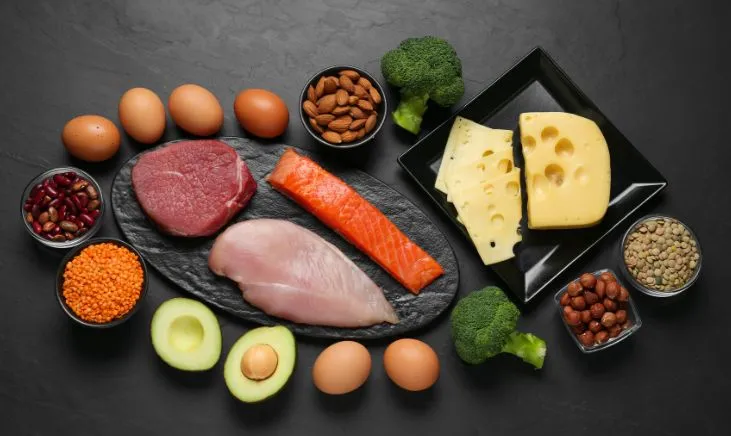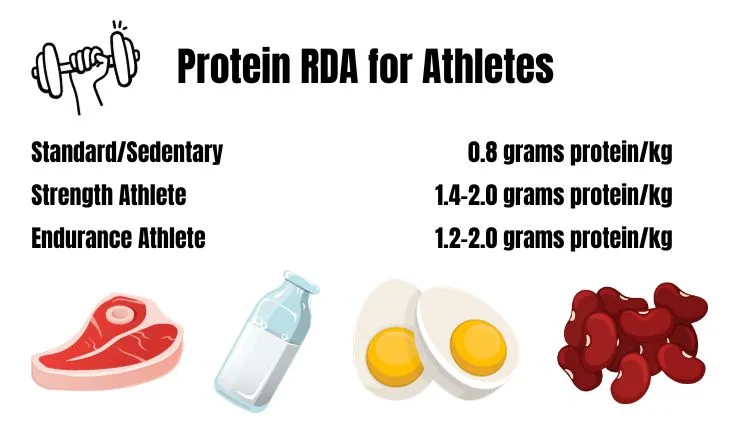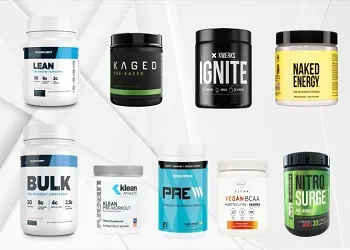Commonly known as the “building blocks of protein”, amino acids are vital for many physiological functions in the human body.
This blog post will look at what amino acids are and what they do for the body.
Table of Contents
What Are Amino Acids?

Amino acids are small, organic molecules that make up all proteins. There are 20 amino acids in total, each of which plays various critical roles in the structure, function, and regulation of tissues and organs in living organisms.
Amino Acids Form Proteins
Amino acids are linked together in chains to form proteins through a process called protein synthesis or translation. Each compound can be identified by its unique side chain.
The diversity in the side chains of each amino acid contributes to the wide array of functions that proteins perform in living organisms. Thus, the sequence and arrangement of amino acids in a protein determine its structure and, consequently, its function.
Role of Amino Acids
In the human body, amino acids are crucial for various physiological processes, including enzyme function, the synthesis of proteins, the regulation of metabolism, and neurotransmitter production. Below, I will break down the two categories of amino acids and what each means.
Essential Amino Acids vs. Non-Essential Amino Acids
Essential Amino Acids
There are nine amino acids that the human body cannot synthesize on its own and must be obtained from the diet. These are known as essential amino acids (EAAs). The nine EAAs are:
- Isoleucine
- Lysine
- Leucine
- Histidine
- Methionine
- Phenylalanine
- Threonine
- Tryptophan
- Valine
It’s crucial to include dietary sources of proteins containing EAAs for proper growth, development, and overall health. They play roles in functions such as increasing levels of serotonin, coordinating muscle function, and strengthening skin and nails.
Non-Essential Amino Acids
You can probably guess that non-essential amino acids are—you guessed it—non-essential. This means that they can be synthesized by the human body and therefore do not need to be obtained from foods that we eat.
The body can produce these amino acids through metabolic pathways. There are eleven non-essential amino acids: glutamine, glycine, alanine, arginine, asparagine, aspartic acid, cysteine, glutamic acid, tyrosine, serine, and proline.
Health Benefits of Amino Acids
We’ve already discussed how many functions amino acids play in the body. Let’s break down six that stand out.
Preserve Muscle Mass
If it isn’t clear by now, amino acids are fundamental for the maintenance and growth of muscle tissue. Amino acids contribute to the preservation of lean muscle mass in the following ways.
Preventing muscle breakdown
If a person is not consuming enough protein, a process called catabolism occurs. This is the breakdown of muscle and is dangerous. When the human body needs additional energy in times of starvation, catabolic illness, restrictive diets, or intense exercise (without proper fuel), it will break down muscle tissue to release amino acids for energy. Combat this by making sure you are fueling appropriately. Below, I’ll review how much protein to consume.
Protein synthesis
When you eat protein, your body breaks the compound down into the smaller amino acids. In turn, the amino acids are used to repair and rebuild muscle fibers.
Muscle repair and recovery
During exercise, muscle fibers experience micro tears. Amino acids, particularly branched-chain amino acids (BCAAs) such as valine, isoleucine, and leucine, play a crucial role in repairing these tears in the muscles.
Leucine in particular plays a huge role in muscle protein synthesis and has been found to have considerable positive effects in prevention of sarcopenia in older adults. By consuming an adequate amount of leucine-rich foods, you can optimize muscle growth.
Hormone regulation
Amino acids influence the release of certain hormones, such as insulin and growth hormone, which play roles in muscle protein synthesis and overall muscle health.
Improved Exercise Performance
Amino acids improve exercise performance bottom line. Whether you’re going for a casual jog in the neighborhood, are a competitive weight lifter, or training for a marathon, amino acids are crucial.
They reduce muscle soreness, prevent the breakdown of muscle while simultaneously building new muscle, are used as a form of energy, enhance endurance, help maintain hydration, and regulate hormones. Seriously, what don’t they do for an athlete?
Better Sleep
There are two amino acids in particular that help promote restful sleep: tryptophan and gamma-aminobutyric acid, more commonly referred to as GABA.
Tryptophan is a precursor to serotonin, a neurotransmitter that contributes to feelings relaxation. Serotonin can then be converted into melatonin, a hormone that regulates sleep-wake cycles.
GABA is an inhibitory neurotransmitter that has calming effects on the brain and can contribute to relaxation and sleep. While GABA supplements are available, their effectiveness in crossing the blood-brain barrier and directly influencing brain GABA levels is a topic of ongoing research. Personally, I have found GABA supplements to be a helpful part of my nighttime routine.
Skin Health
The skin is composed of proteins such as elastin, keratin, and collagen, and amino acids play a crucial role in the synthesis of these proteins. Amino acids contribute to the health of human skin through various functions including collagen and elastin synthesis, hydration support, and UV protection.
Boosted Mood
Amino acids play a significant role in supporting mood by influencing the production of neurotransmitters that can have a significant impact on our mood. Key ways in which amino acids contribute to mood regulation include the synthesis of serotonin, dopamine, and norepinephrine, neurotransmitters that regulate mood and are involved in feelings of motivation, alertness, relaxation, and reward.
What Does Taking Amino Acids Do?
Taking amino acids can have various effects on the body, depending on what is taken. Amino acids play a crucial role in numerous physiological functions, including the repair of body tissues and the synthesis of proteins.
Eating foods rich in proteins and amino acids is always first priority but taking supplements containing amino acids can offer an extra dose of these vital building blocks, presenting concentrated sources that may bring advantages like promoting muscle growth and increasing energy levels.
Below, we’ll break down the food sources of amino acids as well as discuss amino acid supplements.
Food Sources of Amino Acids

Check out our extensive guide to food sources of amino acids. As always, eating a well-balanced diet containing foods rich in amino acids from both animals and plants is critical to health and preventing amino acid deficiencies.
Amino Acid Supplements
Amino acid supplements have been discussed extensively on Everflex’s blog. Check out a dietitian’s take about the pros and cons of supplementing with amino acids.
Signs of Amino Acid Deficiency
Signs of amino acid deficiencies are complex and will vary depending on the individual and which amino acid may be lacking.
General signs of deficiency can include fatigue, delayed wound healing, weakness, muscle atrophy/wasting, difficulty concentrating, dry skin, rash, brittle hair/nails, changes in mood, swelling, and GI issues.
These symptoms are generalized and can be caused by various factors. If you suspect an amino acid deficiency or are experiencing persistent symptoms, consult with a healthcare provider for a clear diagnosis and appropriate intervention. Interventions may include dietary changes, amino acid supplementation, or other targeted treatments based on individual needs.
Recommended Allowances for Protein
The Recommended Dietary Allowance (RDA) for protein is 0.8 grams of protein per kilogram of body weight, or 0.36 grams per pound. The RDA is the amount of a nutrient you need to meet your basic nutritional requirements and is not necessarily the specific amount you are supposed to eat every day.
Athletes or those who exercise frequently need more protein than the RDA to aid in performance and muscle recovery. The International Society of Sports Nutrition (ISSN) recommends an overall daily protein intake in the range of 1.4-2.0 grams protein/kg of body weight daily.

Typically, aim to consume protein in doses of 20-40 grams at a time and spread your intake throughout the day. Per the American College of Sports Medicine, meals with excessive amounts of protein may fail to produce greater muscle growth.
Keep in mind that more protein is not always better. There is limited evidence to suggest that increasing protein above RDA levels is beneficial and, in fact, is likely more harmful as it could cause kidney problems, hydration issues, and low bone mineral density, as excessive protein consumption will displace other important nutrients.
Of course, every individual is unique and there are situations when consuming above the RDA is warranted. Always speak with a registered dietitian or healthcare practitioner if you have questions.
Frequently Asked Questions
How do amino acids affect our body?
Amino acids are critical for many roles in the human body including the synthesis of neurotransmitters and proteins, the repair of tissue, muscle growth, energy, nutrient absorption, mood regulation, immunity, and digestion to name a few.
What is the role of amino acids in human metabolism?
Without getting too scientific, broadly speaking, amino acids are vital in the regulation of human metabolism, aiding in energy production, protein, hormone, and metabolite synthesis, immune function, and the regulation of the body’s pH level.
What are the symptoms of low amino acids?
Symptoms vary depending on which amino acid is low but can include fatigue, delayed wound healing, weakness, muscle atrophy/wasting, difficulty concentrating, dry skin, rash, brittle hair/nails, changes in mood, swelling, and GI issues. Always speak with a healthcare provider if you suspect an amino acid deficiency.
How many amino acids in a protein?
The number of amino acids in a protein can vary widely depending on the specific protein’s structure and function. Proteins are made up of amino acid chains linked together, and the length of these chains can differ significantly.
Works Cited
Hepsomali, Piril, et al. “Effects of Oral Gamma-Aminobutyric Acid (GABA) Administration on Stress and Sleep in Humans: A Systematic Review.” Frontiers in Neuroscience, vol. 14, 17 Sept. 2020, https://doi.org/10.3389/fnins.2020.00923.
Martínez-Arnau, Francisco M., et al. “Effects of Leucine Administration in Sarcopenia: A Randomized and Placebo-Controlled Clinical Trial.” Nutrients, vol. 12, no. 4, 27 Mar. 2020, p. 932, https://doi.org/10.3390/nu12040932.Miers, Wendell R., and Eugene J. Barrett. “The Role of Insulin and Other Hormones in the Regulation of Amino Acid and Protein Metabolism in Humans.” Journal of Basic and Clinical Physiology and Pharmacology, vol. 9, no. 2-4, Jan. 1998, https://doi.org/10.1515/jbcpp.1998.9.2-4.235. Accessed 25 Nov. 2019.














